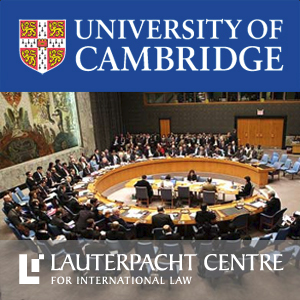LCIL Friday Lecture: Systemic Agents in International Law
Duration: 44 mins 36 secs
Share this media item:
Embed this media item:
Embed this media item:
About this item

| Description: |
Lecture summary: A question that is often under-theorised, or perhaps more accurately, is taken for granted, is the systematicity of international law.
The systemic nature of international law too often is simply presumed, and rests on a vision of international law as merely a body of rules. In this lecture, an alternative account of international law's systematicity will be advanced, one which encompasses not only the systemic character of international legal rules, but instead portrays international law as a socially-constructed system, in which certain key actors play a particularly influential role. |
|---|
| Created: | 2018-01-19 15:45 |
|---|---|
| Collection: | LCIL International Law Seminar Series MOVED |
| Publisher: | University of Cambridge |
| Copyright: | V. Bystry |
| Language: | eng (English) |
| Keywords: | International Law; Gleider Hernandez; LCIL; |
| Abstract: | Lecture summary: A question that is often under-theorised, or perhaps more accurately, is taken for granted, is the systematicity of international law.
The systemic nature of international law too often is simply presumed, and rests on a vision of international law as merely a body of rules. In this lecture, an alternative account of international law's systematicity will be advanced, one which encompasses not only the systemic character of international legal rules, but instead portrays international law as a socially-constructed system, in which certain key actors play a particularly influential role. |
|---|---|
Transcript
Transcript:
Lecture summary: A question that is often under-theorised, or perhaps more accurately, is taken for granted, is the systematicity of international law.
The systemic nature of international law too often is simply presumed, and rests on a vision of international law as merely a body of rules.
In this lecture, an alternative account of international law's systematicity will be advanced, one which encompasses not only the systemic character of international legal rules, but instead portrays international law as a socially-constructed system, in which certain key actors play a particularly influential role.
Gleider I Hernández is Associate Professor (Reader) in Public International Law at Durham Law School, and founding Deputy Director of the Durham Global Policy Institute.
Gleider took a D.Phil from Wadham College, Oxford, and read for an LL.M at Leiden and BCL and LL.B degrees at McGill. Previously, he served as Associate Legal Officer at the International Court of Justice, clerking for Judges Bruno Simma and Peter Tomka. He is the author of The International Court of Justice and the Judicial Function (OUP 2014) and International Law (OUP, forthcoming 2018).
From 2015-2018 he was an AHRC Research Leadership Fellow, leading a project entitled Constructing Authority in International Law. For further information on the project, see http://www.globalpolicyjournal.com/constructing-authority-international-law
The systemic nature of international law too often is simply presumed, and rests on a vision of international law as merely a body of rules.
In this lecture, an alternative account of international law's systematicity will be advanced, one which encompasses not only the systemic character of international legal rules, but instead portrays international law as a socially-constructed system, in which certain key actors play a particularly influential role.
Gleider I Hernández is Associate Professor (Reader) in Public International Law at Durham Law School, and founding Deputy Director of the Durham Global Policy Institute.
Gleider took a D.Phil from Wadham College, Oxford, and read for an LL.M at Leiden and BCL and LL.B degrees at McGill. Previously, he served as Associate Legal Officer at the International Court of Justice, clerking for Judges Bruno Simma and Peter Tomka. He is the author of The International Court of Justice and the Judicial Function (OUP 2014) and International Law (OUP, forthcoming 2018).
From 2015-2018 he was an AHRC Research Leadership Fellow, leading a project entitled Constructing Authority in International Law. For further information on the project, see http://www.globalpolicyjournal.com/constructing-authority-international-law

